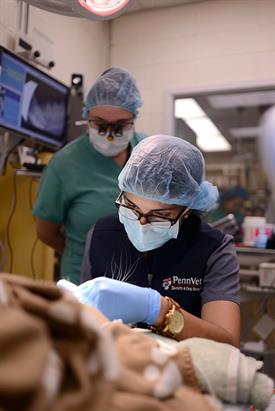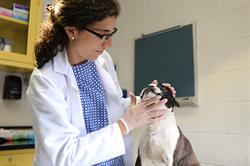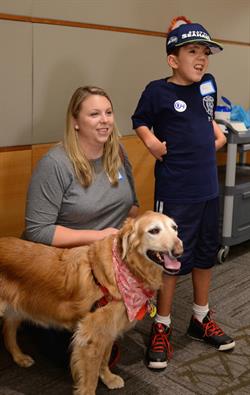Dr. Maria Soltero-Rivera never imagined she would be so inspired by the words of a child playing with a dog.
Last October, she organized the Best Friends Bash—a chance for young patients at Children’s Hospital of Philadelphia to socialize with dogs at Penn Vet bearing similar craniofacial conditions. A specialist in dentistry and oral surgery, Soltero-Rivera was deeply moved by witnessing the smiles on the children’s faces as well as the profound connections between human and animal health.
 “We were doing interviews for a video about the event, and they asked one little girl what was the most important thing she learned. She said people have to realize that different is good. That phrase stuck in my head. It’s absolutely true,” Soltero-Rivera said.
“We were doing interviews for a video about the event, and they asked one little girl what was the most important thing she learned. She said people have to realize that different is good. That phrase stuck in my head. It’s absolutely true,” Soltero-Rivera said.
Her colleagues know her as a veterinarian who is equally gifted in technical knowledge and in showing compassion for animals and families, which made her the natural choice to take the helm of the Best Friends Bash. Described as a model resident and talented researcher, she is on the fast track to becoming a leader in her field.
Soltero-Rivera has been interested in veterinary medicine since high school in Puerto Rico, but she initially thought she would focus on farm animals. “In my undergraduate studies in animal sciences, I learned about production animals. I really enjoyed being out on the farms in Puerto Rico. It’s very peaceful,” she said.
While in vet school, she volunteered with Dr. Marilucy Quinones, a small animal surgeon who started the first specialty vet practice in Puerto Rico. That’s when Soltero-Rivera realized she wanted to help companion animals. “Dr. Quinones was able to provide me with a well-rounded experience, including dentistry, and the experience was life changing,” she recalled.
At Cornell University College of Veterinary Medicine, where she earned her DVM in 2008, Soltero-Rivera delved into dentistry with Dr. Jennifer Rawlinson, who had done her residency at Penn Vet and later started the animal dentistry service at Cornell.
“She is the whole reason I love dentistry. She showed me how fun it is,” said Soltero-Rivera. She added that Drs. Quinones and Rawlinson are inspiring role models, because they are stellar veterinarians who also successfully juggle the responsibilities of being wives and mothers.
“Then I came to Penn for my residency and absolutely fell in love with the place,” she said. She has been at Penn Vet since July 2010.
Soltero-Rivera’s mentors, who are now her colleagues, quickly grew to appreciate her as well. One of them, Dr. Alexander Reiter, challenged her to succeed.
Reiter, head of the Dentistry and Oral Surgery Service at Penn Vet, said he pushes his students to perform at the highest level. He described Soltero-Rivera as “a model resident” due to her exceptionally strong and broad foundation of theoretical and practical knowledge, combined with genuine compassion for pets and owners.
He added that Soltero-Rivera invites collaboration, an important skill for advancing research in the field. Also an excellent teacher, Soltero-Rivera communicates equally well in front of students or experienced professionals at international conferences.
“During her first visit to Penn, her love for teaching became obvious when she volunteered to help teach a physical exam lab for first-year students, right after her interview. That raised our interest in her right away,” Reiter said.
In the 1970s, Penn’s veterinary school became the first in North America to offer an organized program in veterinary dentistry and oral surgery. The Dentistry and Oral Surgery Service at Ryan Hospital is considered a world leader for teaching, research, and clinical work.
 “You can make such a big difference in an animal’s life by taking care of the oral cavity,” said Soltero-Rivera. She noted that when a general practice pays attention to dentistry, it’s a sure indication of attention to detail.
“You can make such a big difference in an animal’s life by taking care of the oral cavity,” said Soltero-Rivera. She noted that when a general practice pays attention to dentistry, it’s a sure indication of attention to detail.
Her department, employing three residents, is immersed in researching potential new therapies as well as providing daily care for animals.
“We treat anything from gingivitis in a dog or cat, to tumors in older animals, to puppies with cleft palates. We can diagnose and treat medical problems with salivary glands. Our service involves endodontics, periodontics, oral surgery, restoratives, and prosthodontics,” explained Soltero-Rivera, adding, “I like that I don’t do same thing every day. I treat animals, do research, and teach.”
One research area that shows promise is regenerative medicine, particularly stem cell therapy to treat inflammatory conditions in cats and other animals. Drawing upon Penn Vet’s commitment to One Health—pursuing collaborations that connect human, animal, and environmental health—Soltero-Rivera is investigating the new technique with Dr. Anh Le, Chair and Norman Vine Endowed Professor of Oral Rehabilitation, and senior investigator Dr. Qunzhou Zhang, both of Penn’s School of Dental Medicine.
Current treatment methods for inflammatory conditions involve surgery and medications. Feline gingivostomatitis, which causes inflamed gums and oral mucosal tissues in cats, is typically solved by performing full mouth extractions.
“It does the trick in about 80 percent of patients, but it would be ideal to do something less invasive,” Soltero-Rivera said, adding, “We’re very early in our work in stem cell therapy. But stem cells have been proven to have immunomodulating effects.”
If it comes to fruition—a process that could take several years of research and trials—this therapy could treat not only stomatitis but also periodontal disease and autoimmune diseases in the oral cavity. About 80 percent of animals seem to have some form of periodontal disease, manifested as mildly as redness of the gums or as severely as losing teeth or even fracturing a jawbone.
Similar stem cell therapy techniques are already used to some extent in people to treat inflammatory bowel disease and Crohn’s disease, both of which cause inflammation of the gastrointestinal tract.
Soltero-Rivera says her department has also pursued an increasing number of craniofacial reconstructions. Pet owners from all over the country come to Penn Vet for palatal repairs for their animals.
“We’re finding new things to try, and we’re improving our procedures. We’re fixing bigger defects,” she said. One of Penn Vet’s most advanced periodontal procedures is guided tissue regeneration, which involves rebuilding the supporting structures of the teeth.
“I’m also collaborating with Dr. Melissa Sanchez in the pathology department to better research disease progression. We’re trying to advance the knowledge of disease processes that haven’t been described well before,” Soltero-Rivera said.
 Among Penn Vet’s recent successes is the cleft palate surgery for Lentil the bulldog in 2013. Lentil became a media darling whose story was avidly followed all over the Internet, and his case has drawn clients for cleft palate repairs from as far away as Utah and Idaho, says Soltero-Rivera.
Among Penn Vet’s recent successes is the cleft palate surgery for Lentil the bulldog in 2013. Lentil became a media darling whose story was avidly followed all over the Internet, and his case has drawn clients for cleft palate repairs from as far away as Utah and Idaho, says Soltero-Rivera.
An “ambassadog” of sorts for overcoming craniofacial problems, Lentil’s story inspired the Best Friends Bash—a celebration that took place at Penn Vet’s Hill Pavilion in 2013 and at CHOP in 2014. A social, therapeutic occasion for children with craniofacial conditions and their families, the party exemplifies the One Health mission of connecting animal and human health. The event is made possible through the generous contribution of the Edwin and Fannie Gray Hall Center for Human Appearance.
Soltero-Rivera is excited to continue the work of the Best Friends Bash. She inherited leadership of that initiative from one of her Penn Vet mentors, Dr. John Lewis, then an Associate Professor of Dentistry and Oral Surgery. “I was fortunate to take the reins on this effort. It keeps growing every year,” she said. It’s an effort that’s grown close to her heart.
Lewis, who is now at NorthStar VETS in Robbinsville, New Jersey, said it was easy to pass the responsibility to her: “She’s been a great asset to the University ever since she was a resident. It was obvious she was a gifted clinician and a talented oral surgeon, and just an overall wonderful person.”
This year, both dogs and children attending the bash wore superhero capes, and the kids shared trading cards with facts about the dogs they were meeting.
The animals Penn Vet finds for the party are trained to comfort children who are going through similar craniofacial procedures. There was a dog that had part of his upper jaw removed, and dogs with multiple tooth extractions and scars.
“We introduced them to the kids and talked about each one of them,” explained Soltero-Rivera. “These kids are normally very shy, but when you put them in a room together like this with dogs, they just come out of their shells. It’s a day when they don’t have to feel different.”
And, as one young patient observed, it may also be a day to learn that different can be just fine.